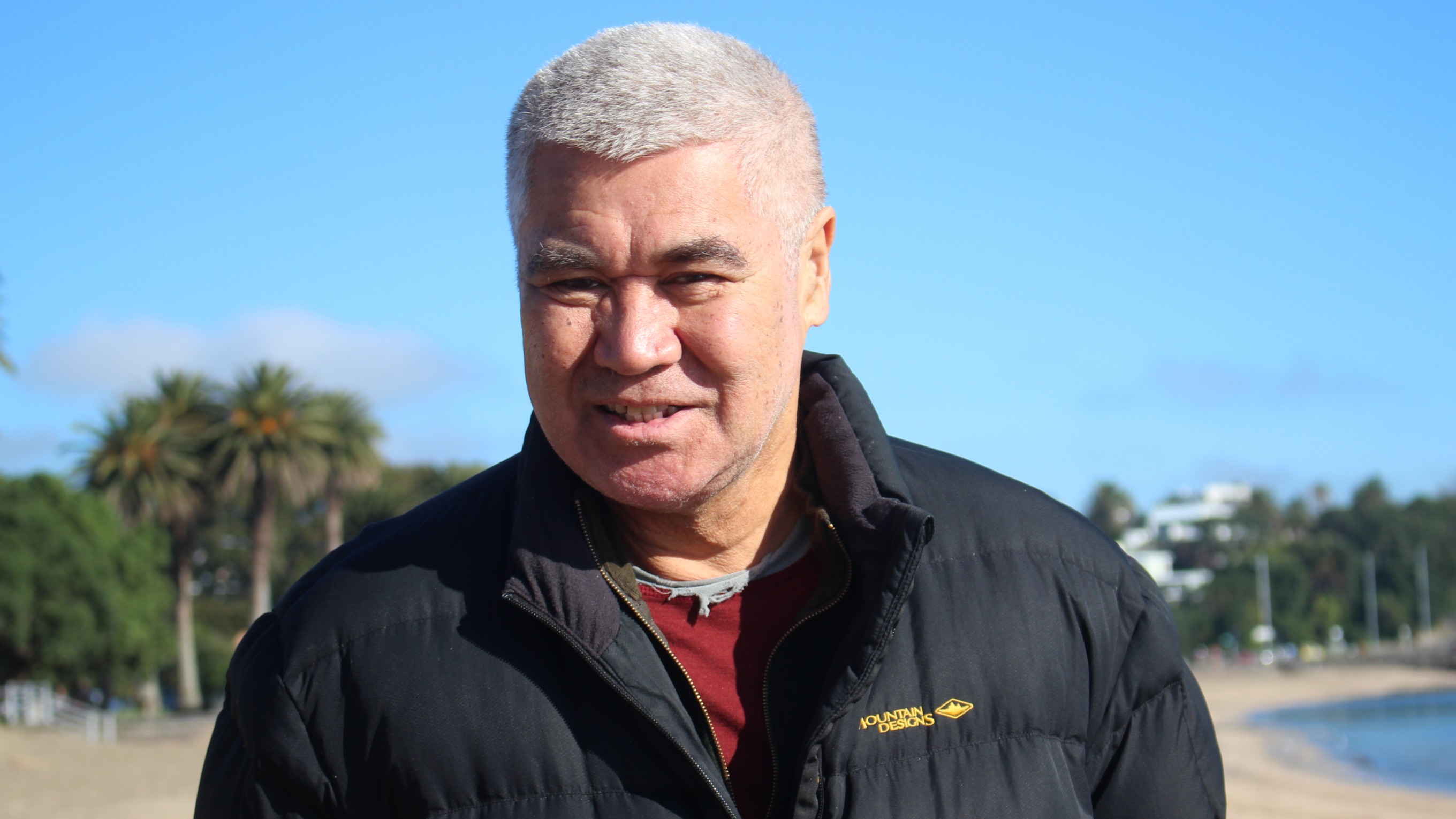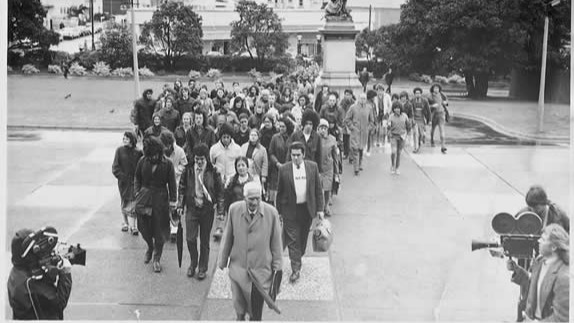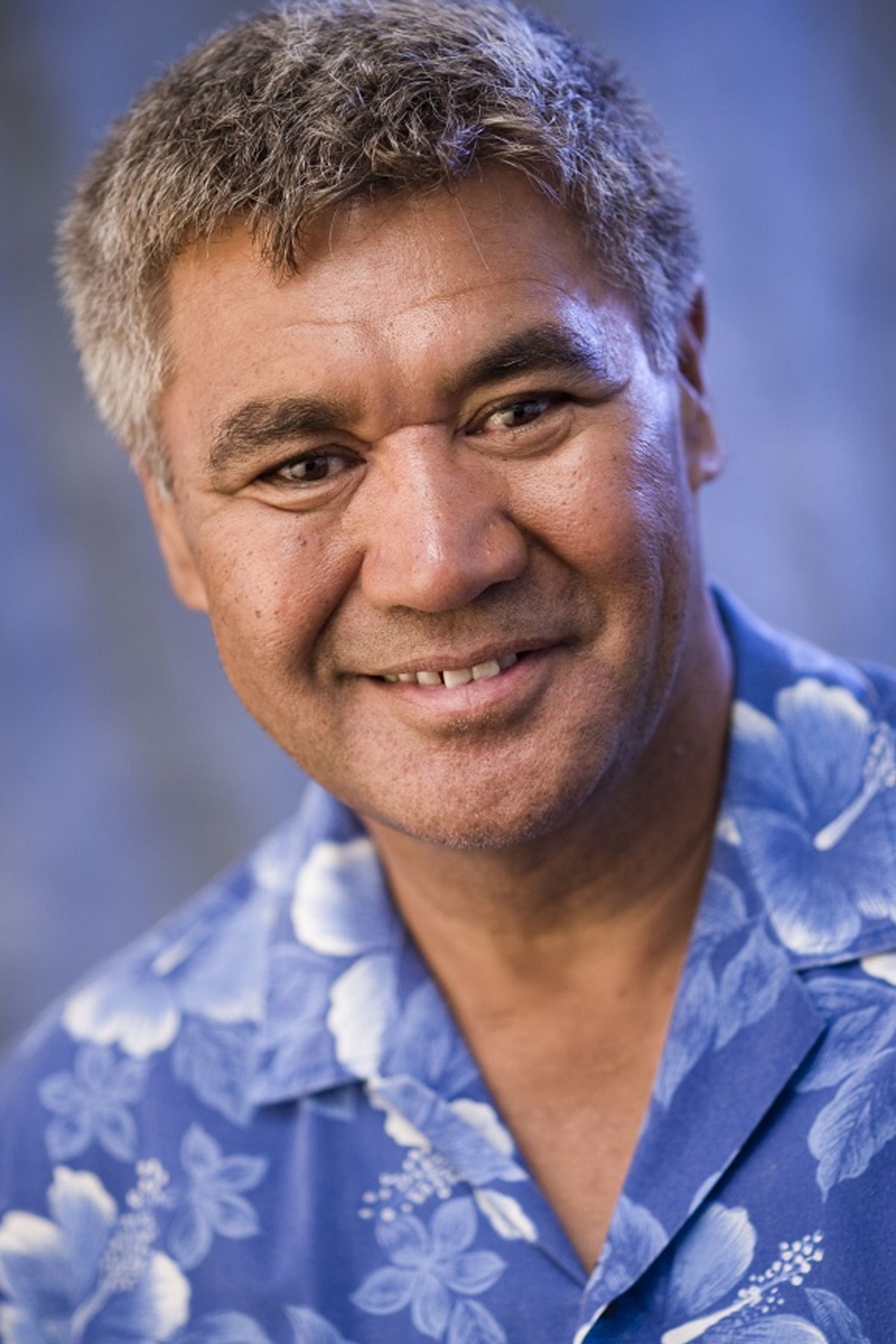In celebration of Te Wiki o Te Reo Māori, our 2019 guest editor Kura Rutherford spoke to actor, writer, and activist Rawiri Paratene (Ngāpuhi) about the books from his youth that shaped him. Their conversation also ranged to his career in writing and theatre, his vision for strengthening te reo Māori, and the thing that binds them all together – stories.

Rawiri has been a constant on our national stage over his career, sometimes a bit left of the spotlight, sometimes in the floodlit centre.
You may remember him on Play School, or in one of his many Shakespeare roles, as Koro in The Whale Rider, or Arthur in The Insatiable Moon. If you go back over the footage of the 1972 Māori language petition being delivered to parliament, you’ll see him there too.

My classmates and I had the privilege of getting to know Rawiri in Opononi, Hokianga, our shared hometown, when Rawiri set up a film-script writing competition at school, and we all filmed and produced the winning script. The movie, The Sand Kids (long lost in the dust of school archives), set on the sand dunes on the north side of the harbour, was about Kupe’s arrival in Hokianga, and Rawiri was our director. We camped for a week at Rangi Point, walking miles across sand plains and moonscapes to film in tucked away rock forms and valleys, trekking back to camp each night. Rawiri didn’t say a lot, but when he talked we listened. He taught us about being in front of the camera and behind it. We learnt how to tell our story.
Rawiri didn’t say a lot, but when he talked we listened.
Rawiri likes a good story. He was brought up on them, lots of them. He doesn’t remember having books at home when he was young – either having them read to him or reading them. ‘I didn’t learn how to read for a while; I didn’t have books.’ But he remembers being told stories by his dad – he thought at the time that they were made up, but later realised they were Aesop’s Fables. ‘Dad was a storyteller… we had stories but not writing.’
It was later, at high school at Hillary College in Ōtara, that Rawiri really discovered the joy of the written word, thanks to his teachers. Having by then well and truly mastered the art of reading, he starting reading the classics, and in particular the famous storyteller, William Shakespeare. ‘[My teachers] were fantastic. They saw that I liked Shakespeare and that I liked all of those old books, so they helped. They saw… that I really loved it.’
Sometimes a book at just the right time can change the course of our lives. For Rawiri, it was reading the works of Shakespeare at high school. His appreciation for the work of the Bard took him from secondary school straight into drama school, and Shakespeare has stayed a fixture in his life. He’s played Romeo, Friar Lawrence, Lear, Troilus and Gloucester, he has performed in the Globe Theatre, and he has travelled the world as Hamlet. And over the years, his love of Shakespeare has only grown. ‘[Shakespeare] really understood human nature. And in fact he is a student of human nature. And that’s one of the main things for me.’
He’s played Romeo, Friar Lawrence, Lear, Troilus and Gloucester, he has performed in the Globe theatre, and travelled the world as Hamlet, and over the years, his love of Shakespeare has only grown.
Alongside Shakespeare’s writing, his teachers encouraged him to read other classics, and by the time he had finished school he had got through most of them, ‘Oh yes… I liked Pride and Prejudice. It’s so well-written. I read that quite a few times. And I got to like Dickens. Oh gosh, what’s his name, Pip… yes, Great Expectations. I liked Thomas Hardy, it was about the land for me. And then the classic comics and books like Catch-22, popular books when I was young.’
While English classics may have provided inspiration for Rawiri during his high school years, it was issues close to home that really captured his heart. Around the same time as discovering the classics he joined the activist group Ngā Tamatoa as a 16 year old, and was one of the group who slept on the steps of Parliament in 1972 in a bid to highlight the historical injustices that had led to the erosion of Māori rights and language.

The work of this movement of activists – which included Syd and Hana Jackson (née Hemara), Lee Smith, Hone and Hilda Harawira (née Halkyard), and Tame Iti, to name but a few – is well documented as being integral to a fundamental shift in public consciousness about Māori rights and the status of te reo Māori in Aotearoa. Their work led to the first Te Wiki o te Reo Māori celebrations (which began as Māori Language Day) being celebrated in 1975.
The increased social awareness meant indigenous writers and creatives of Aotearoa were finally being published. In 1972, Witi Ihimaera was heralded as the first Māori writer to publish a book, with his collection of short stories Pounamu Pounamu and then his novel Tangi in 1973. In 1975, Patricia Grace’s book Waiariki was the first short story collection to be published by a Māori woman.
Rawiri, then a recent (and the first Māori) graduate from the New Zealand Drama School, was really stirred by the writing coming from Aotearoa at the time. ‘Patricia Grace, oh yeah, beautiful. And Witi Ihimaera, and I got into Baxter and Hone Tuwhare – all of them, I started reading them.’
‘Patricia Grace, oh yeah, beautiful. And Witi Ihimaera, and I got into Baxter and Hone Tuwhare – all of them, I started reading them.’
Buoyed by the work of these authors, Rawiri started writing too. It had always been his plan, as soon as he discovered Shakespeare back in high school. ‘I loved Shakespeare, and Shakespeare was a writer, so it came to that.’ Soon after drama school he wrote and produced a radio play, ‘and I won something or other. I started writing, I did my first play writing, and it was a one-act play, and I won something for that too.’ Over the years, writing has increasingly become Rawiri’s focus; ‘plays, and TV, mostly TV writing, and producing.’
And along the way he has won lots more awards: a Māori Writers’ Award in 1976, the Mobil Radio Award in 1980 for the radio play Proper Channels, the Robert Burns Fellowship in 1983, Best Actor Awards in the New Zealand Film and Television Awards in 1996 (Hare in Dead Cert) and 2011 (Arthur in The Insatiable Moon), the Office of the New Zealand Order of Merit for services to film, television and theatre in 2013, and in 2016, the Toi Māori achievement award.
These must have all been huge occasions in such a productive career, but perhaps nothing could top the moment when he and the rest of the theatre troupe Ngākau Toa took to the stage at the Globe to Globe festival at the Globe Theatre in London, performing Shakespeare’s Troilus and Cressida completely in te reo Māori. ‘I remember that when I went to the Globe for the first time… I remember going straight away ‘we have to do that’ [bring a play in te reo Māori to the Globe], and I realised that I could, and we did, and it was right. Because like the marae, that speaks straight to the people, that’s the same at the Globe.’
Last time I checked, none of our class went on to become famous movie stars after our week on a film set with Rawiri, but we did get a close-up appreciation of the ‘north side’ that we looked at from our classrooms. We all got to play a role – be it actor or assistant director – in one of our region’s stories, we dressed up for the world premiere of the film in the school gym with all the glitz and attention of the real thing, and we all knew we were a bit lucky to spend that hot long week walking the dunes, led by a quiet man with a solid tread, who brought worlds together for us.
Perhaps that is one of the gifts that Rawiri has given us all over the years, bringing worlds together: the sand dunes and the red carpet, Patricia Grace and Jane Austen, the marae and the Globe theatre. And this whakaaro is also reflected in Rawiri’s wish for te reo Māori, a vision of bringing everyone on the journey to revitalise the Māori language; ‘I’ve always wanted everybody, all New Zealanders, to be learning and speaking both [te reo Māori and English]. We should. And the sooner the better, because when we did the marches and all of that, that’s what it was all about, and it’s still the same. So if we really believe that reo has to be strong, then it has to be for all of us.’
But he’s clear it’s not his fight anymore, he’s passing that on to the next generation. ‘It’s up to my moko now, it’s up to my kids. It’s up to the younger ones now I think.’
That’s us he’s talking about – it’s up to all of us. Kia kaha te reo Māori!

Kura Rutherford
Kura Rutherford (Te Rārawa, Ngāpuhi) is a school librarian, writer and editor, who lives in Tāmaki Makaurau. She grew up in Hokianga and Grey Lynn, before moving to Hawke’s Bay for 20 years with her husband, Dominic, to bring up their three daughters. She worked for 10 years in public libraries in customer service and community roles before becoming the sole charge school librarian at Taikura Rudolf Steiner School in Hastings. Now having returned to Tāmaki with her family, she works in the same role at Michael Park School in Ellerslie. She has been connected to Steiner education since she was 23 when she and her husband worked for a year at Hōhepa Farm in Hawke’s Bay, and all three daughters have attended Steiner schools. Kura’s writing focus is on health, education and literature, and she has written for The Sapling, Good magazine, EBSCO databases, Magpies magazine, and craft magazine Extracurricular. She has a special interest in supporting organisations in their te reo Māori strategic planning and development aspirations.



